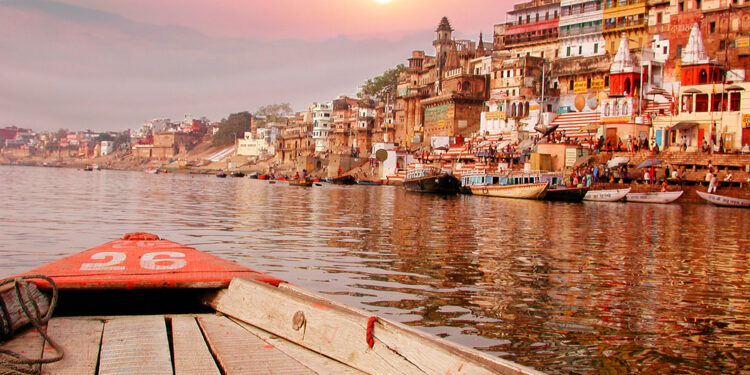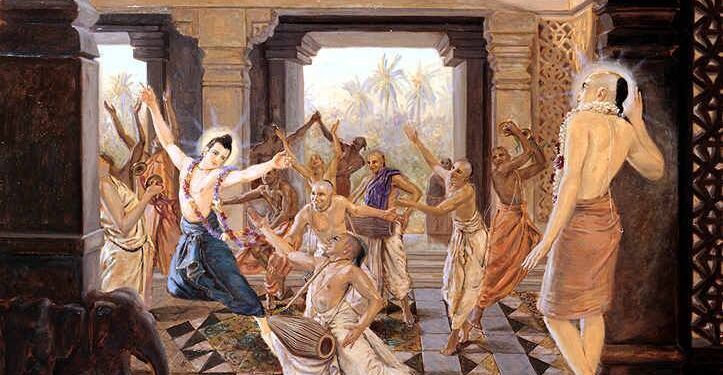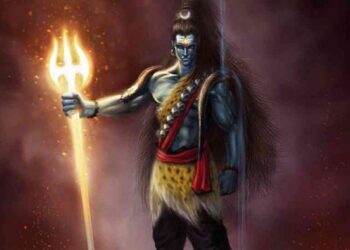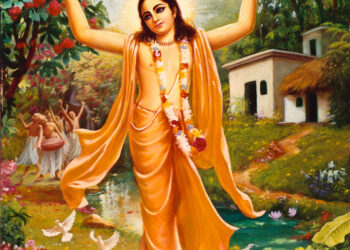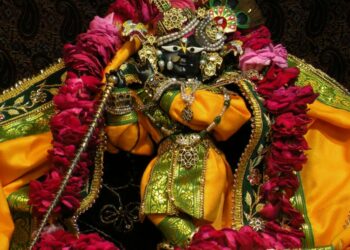Told by Viśvāmitra to Rāma and Lakṣman upon reaching the Ganges
In the far north there stands Himalaya, the king of mountains, whose presiding deity is known as Himavan. This Himavan, through his consort Mena, the daughter of the celestial Mount Meru, begot two charming daughters, both matchless in beauty. The elder of the two was named Gaṅgā and, upon the supplication of the gods, she later became this holy river. The other girl was called Umā, and her father conferred her upon the unlimitedly powerful Śiva to be his wife. After marrying that girl, who is also known in this world as Parvati, Śiva sported with her in regions of celestial bliss.
Becoming concerned, the gods with Brahmā at their head went before Śiva. They fell prostrate before him and said to him, “O lord, the worlds will not be able to bear your seed should it be released into Umā. The combined power of you and your consort will surely be unbearable to all beings. Please therefore retain your vital energy within your supremely splendid self. You will thereby preserve the worlds from being burned by the brilliance of your progeny.”
Śiva, who always remains fixed in thought of Viṣṇu and is ever compassionate to all beings, replied, “It shall be as you say, for the words of the gods can never be denied. But my vital seed already stands dislodged from my heart. Where then shall it fall?”
Brahmā replied, “Your seed should fall upon earth, for she alone is capable of withstanding its power, bearing as she does the weight of all creatures.”
Śiva let fall his seed, which covered the whole globe. Brahmā instructed Agni, the god of fire, “Accompanied by Vāyu, move quickly across the surface of the earth and suck up Śiva’s mighty seed. Previously the gods had asked me that I provide them with a powerful commander for their army. Cause Śiva’s seed to be borne by Gaṅgā, so that she may bring forth a blazing son who will become the general of the gods.”
Agni at once caught up all of Śiva’s vital fluid and went before Gaṅgā, saying, “Be pleased to receive Śiva’s seed, O Goddess!”
Gaṅgā assumed an ethereal human form of exceptionally exquisite beauty. Upon seeing this form, Śiva’s seed melted and the god of fire impregnated Gaṅgā all over with that glowing fluid.
Burning with Śiva’s fiery seed coursing through her veins, Goddess Gaṅgā said to Agni, “O shining one, I cannot bear this flaming seed, which has been made even more powerful by your touch.”
Agni told her to discharge the seed upon the Himālayas and Gaṅgā immediately expelled it from her body. It emerged from her in a brilliant stream and fell upon the earth, forming vast veins of gold and silver. Even at a great distance mines of copper, lead and tin were created by that divine fluid.
At the exact spot where Śiva’s vital seed landed there grew up a thicket of brilliant white reeds. The union of Gaṅgā with the seed of Śiva conceived a child who was born from out of those reeds. He has become known in all the worlds as Skanda. Indeed, he is the powerful general of the gods, also famous as Kārttikeya, for he was raised by the six goddesses known as the Krittikas. Even now that god can be seen in the sky shining amid the constellation of Krittika.

After Kārttikeya’s birth the gods approached Śiva’s consort and, pleased in mind, worshipped her. However, she felt angry at having been denied union with her consort and, with bloodshot eyes, she pronounced a curse upon both the gods and the earth. “As I was denied my desire of getting a son, so too shall all you gods remain always issueless. This earth shall have a jagged surface of many shapes and forms and shall have many masters. She shall never enjoy the delight of having a son since she has deprived me of my own child.”
Some time after this, a king named Sagara ruled over Ayodhya. From out of his two wives the king had sixty thousand and one sons. By the gods’ arrangement, one wife gave birth to a fetus shaped like a gourd, which then split into sixty thousand pieces. These pieces were placed in sixty thousand pots of ghee and gradually they grew into babies. The other wife gave birth to a boy in the normal way.
The sixty thousand sons were of wicked conduct and caused pain to all living beings. The one son, however, was pious and became the beloved of all the people.
One day King Sagara performed a horse sacrifice for the good of the world. Upon seeing the sacrifice, Indra became concerned that Sagara may exceed him in pious merits and thereby take his post in heaven, which Indra himself had won by the performance of pious acts of sacrifice. Indra thus assumed the form of a fierce Rākṣasa and seized the sacrificial horse, taking it away to a distant place.
King Sagara ordered his sixty thousand sons to search out that horse. The princes traveled all over the earth, but could not see the horse. They excavated the earth’s surface and searched the subterranean regions, but still to no avail. Excavating and looking in all directions, the princes created havoc and killed innumerable creatures. The gods went before Brahmā and asked that he stop them. Brahmā informed them that Mother Earth is always protected by the Supreme Lord Viṣṇu, who was at that time dwelling in the earth’s subterranean region. Sagara’s sons would soon be destroyed by that very Lord, who had assumed the form of a sage named Kapila.
In time the princes arrived before Kapila and found him seated in meditation. The sacrificial horse was grazing nearby, left there by Indra. Becoming furious they said to Kapila, “O evil-minded one, you have stolen this horse! We shall now kill You and take it back!”
Hearing this threat and seeing before Him the sixty thousand sons of Sagara, Kapila, a sage of immeasurable power, became angry. Due to their offense in having assailed the divine Ṛṣi Kapila, all the princes were immediately burned to ashes by a fire which emanated from their own bodies.
After some time King Sagara became concerned about his sons. He ordered his one remaining son, Amsuman, to go after them. Amsuman also found Kapila sitting in meditation and saw before Him his brothers’ ashes, destroyed by their offense against the sage. Grieved by his brothers’ deaths, Amsuman looked all around and saw Garuḍa, Viṣṇu’s great eagle carrier who had come to serve his master. Garuḍa told Amsuman that he should devise some plan to bring the Ganges to earth so that her waters could flow across his brothers’ ashes and thus liberate them from hell. Amsuman offered prayers to Kapila and received from Him the horse, whereupon he went back to his father.
Despite every attempt to perform sacrifice and pray to the gods, neither Sagara nor his son were able to cause the Ganges to flow across the earth. It was several generations later that the famous King Bhagīratha finally succeeded. By dint of his great asceticism he pleased Brahmā, who ordered the Ganges to fall to earth.
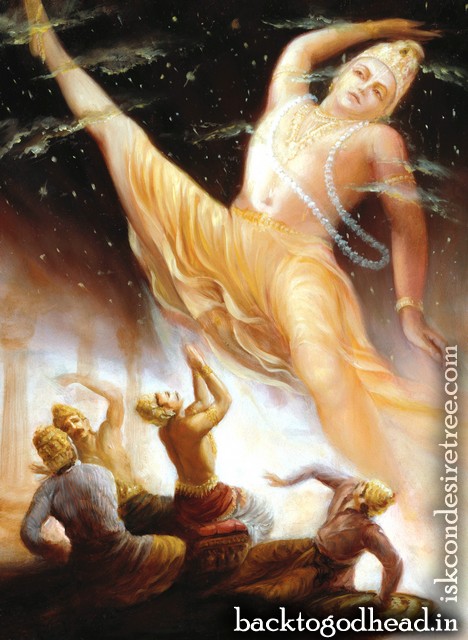
The river Ganges, known in heaven as the Mandakini, emanated originally from Viṣṇu’s foot. When He kicked a small hole in the shell of the universe, the waters of the causal ocean, in which all the innumerable universes float, entered. Falling down to the heavens, the water was entered by the goddess Gaṅgā who then, on Brahmā’s order, brought it down to earth. This water filled the huge excavation made by Sagara’s sons and thereby became the great ocean. It flowed down to the subterranean region where it liberated the sixty thousand princes by covering their ashes. It is that same sacred river, made holy by the touch of Viṣṇu’s foot, which you now see before you, O valiant princes. To this very day anyone whose ashes are placed in this river is immediately liberated.


